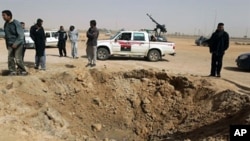Last week, Britain and France began floating the idea of a No-Fly Zone over Libya among the 15-members of the U.N. Security Council to mixed reaction. On Saturday, the Arab League endorsed the idea, and on Monday, Lebanon called a meeting of the council to discuss the matter.
But after three hours of closed-door discussions, which included a briefing by the U.N.’s top political officer, Russian Ambassador Vitaly Churkin told reporters essential questions still remain to be answered.
"As far as we are concerned, some fundamental questions need to be answered, not just what we need to do, but how it’s going to be done. If there is a No-Fly Zone, who is going to implement a No-Fly Zone? How [is] the No-Fly Zone is going to be implemented?" Churkin asked. "Without those details or answers to those questions, it is very hard to make a responsible decision. Unfortunately, so far the answers to those questions have not been provided by the main proponents of this proposal."
Ambassador Churkin said it is important that the Security Council, which would need to authorize a No-Fly Zone with a resolution, not do anything to exacerbate the situation in Libya. But he did not rule out the possibility of Moscow eventually endorsing a No-Fly Zone.
"We are open-minded. And we are looking at various ways in order to effect the situation in a positive way - to stop bloodshed, prevent further casualties especially among civilians, and to achieve a political outcome. But as I say, we have not had enough information," Churkin said. "To say we need to act quickly, as fast as possible, but not to provide those fundamental answers to those fundamental questions, to us is not really helping, it is just beating the air. You need to be specific when you make a proposal of this fundamental importance.”
French Ambassador Gerard Araud, who along with Britain, has been at the forefront of the move toward authorizing a No-Fly Zone in the council, urged his Russian counterpart and others with questions to look at the resolution authorizing the No-Fly Zone over Bosnia-Herzegovina in 1993.
"The Resolution 816 did not say who was imposing the No-Fly Zone, how it was going to be imposed. This Council is not a military headquarter; this Council is supposed to give a political authorization, and, after that, the countries can work together to impose it," Araud said.
Ambassador Araud said several countries would begin working Monday afternoon on a formal draft resolution, and he hoped to have one "as soon as possible."
Russia: Questions Remain Over Libya No-Fly Zone










